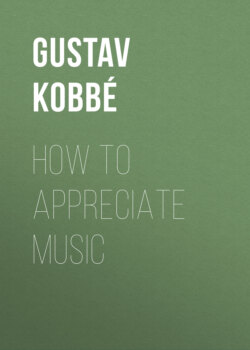Читать книгу How to Appreciate Music - Gustav Kobbé - Страница 6
На сайте Литреса книга снята с продажи.
Melody and Accompaniment on One Instrument.
ОглавлениеThis personal, one-man control of the instrument has been of inestimable value to the pianoforte in establishing itself in its present unassailable position. Moreover, in controlling it the pianist commands all the resources of music. With his two thumbs alone he can accomplish what no player upon any other instrument 34 in common use is capable of doing with all ten fingers. He can sound together the lowest and the highest notes in music, for all the notes of music as we know it simply await the pressure of the fingers upon the keys of the pianoforte. It is the one instrument capable of power as well as of sweetness and grace which places the whole range of harmony and counterpoint at the disposal of one player. A vocalist can sing an air, but can you imagine a vocalist singing through an entire programme without accompaniment? After half a dozen unaccompanied songs the singing even of the greatest prima donna would become monotonous for lack of harmony. The violin and violoncello, next to the pianoforte the most frequently heard instruments in the concert hall, labor under the same disadvantage as the singer. They are dependent upon the accompaniment of others.
The pianist, on the other hand, has the inestimable advantage of being able to play melody and accompaniment on one instrument at the same time—all in one. While singing with some of his fingers the tender melodic phrase of a Chopin nocturne, he completes with the others the exquisite weave of harmony, and reveals the musical fabric to us in all its beauty. Moreover, it is the pianist himself who does this, not some one else at his signal, which the intermediary possibly may not wholly understand. When Paderewski is at the pianoforte we hear Paderewski—not some one else of a less sensitive temperament whom he is directing with a baton. A poet is at the instrument and we hear the poet. A poet may be at the conductor’s desk—but in the orchestra that is required for the interpretation 35 of his musical conceptions poets usually are conspicuous by their absence. Even great singers suffer because their accompaniments are apt not to be as sensitive of temperament as they are; and it is a fact that the grace and beauty of Schubert’s “Hark, Hark, the Lark” never have been so fully revealed to me by a singer as by Paderewski’s playing of Liszt’s arrangement of the song, because the pianist is able to shade the accompaniment to the most delicate nuances of the melody. How delightful, too, it is to go through the pianoforte score of a Wagner music-drama and, as you play the wonderful music—all placed within the grasp of your ten fingers—watch the scenic pictures and the action pass in imagination before your eyes in your own music room without the defects inseparable from every public performance, because the success of a performance depends upon the co-operation of so many who do not co-operate. Yes, the pianoforte is the king of instruments because it is the most independent of instruments and because it makes him who plays upon it independent.
